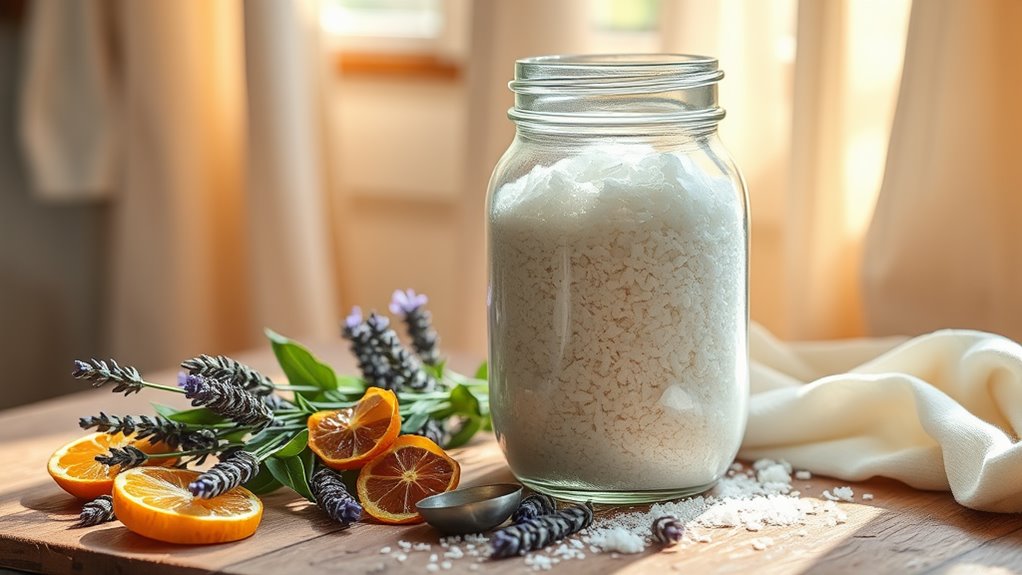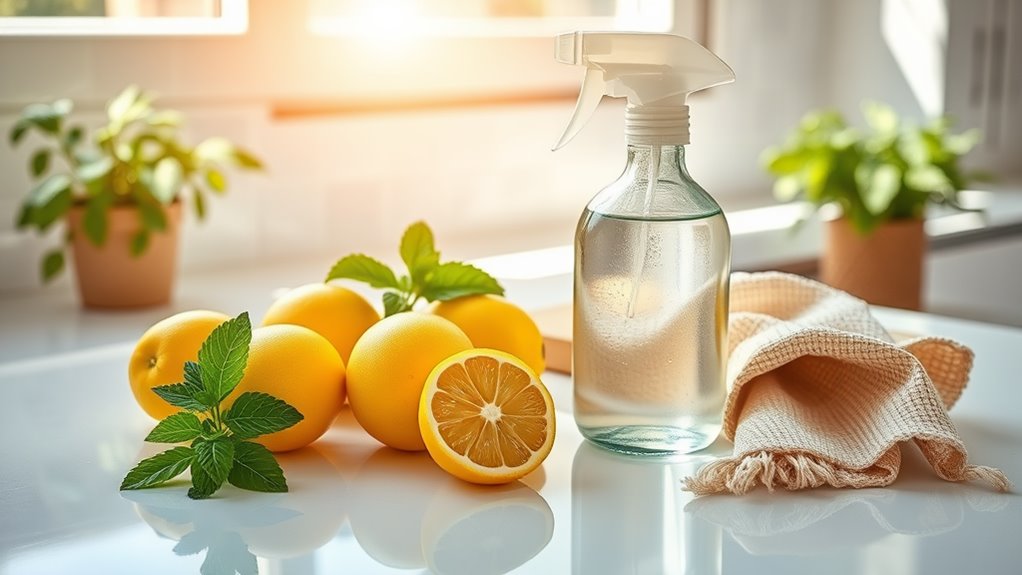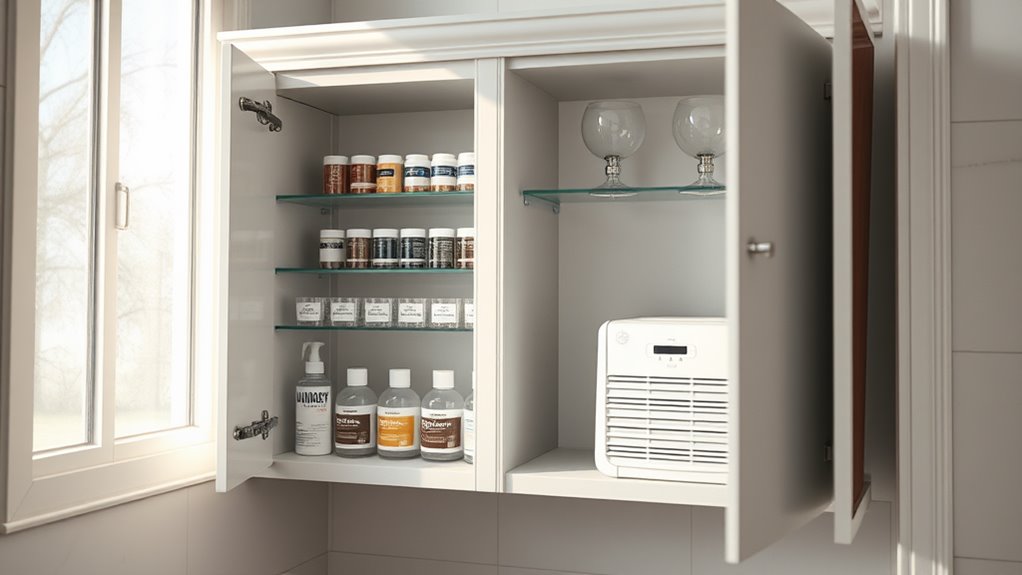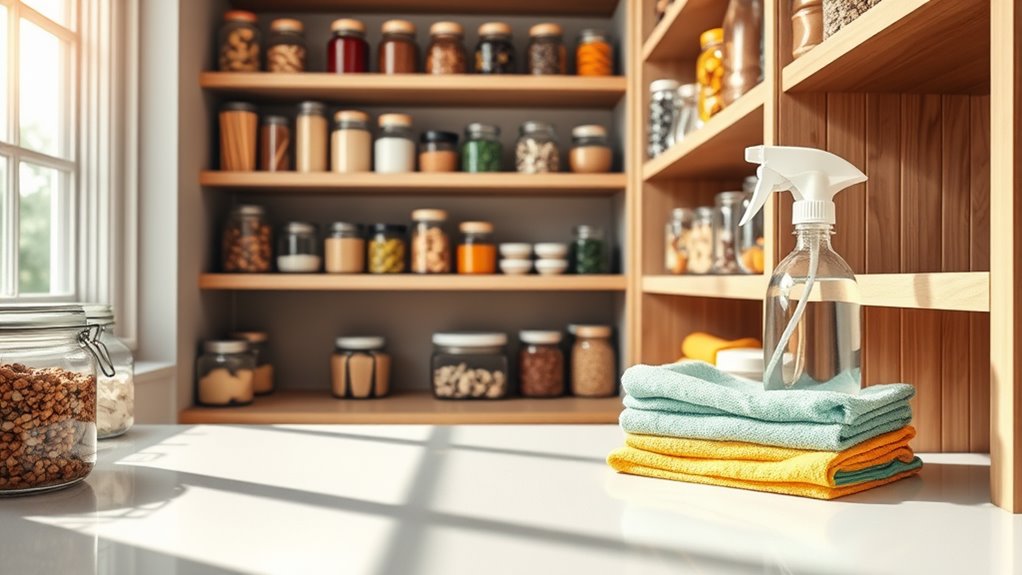This Homemade Laundry Soap Is Cheaper AND Smells Better
Homemade laundry soap is not only cheaper than store-bought options, but it also lets you create delightful, custom scents that make your laundry smell amazing. By crafting your detergent, you control the ingredients, avoiding harsh chemicals and reducing plastic waste. Plus, it’s satisfying to personalize your laundry experience. You’ll find that it competes well with commercial products in both effectiveness and fragrance. Discover more about how to make your own and enhance your laundry routine.
Key Takeaways
- Homemade laundry soap significantly reduces costs compared to store-bought options, saving you money on cleaning supplies.
- You control the ingredients, eliminating harsh chemicals while ensuring a pleasant scent with natural fragrances or essential oils.
- Customization allows you to create a unique scent tailored to your preferences, enhancing the laundry experience.
- Eco-friendly components reduce waste and support sustainable practices, making your laundry routine better for the planet.
- Users report effective stain removal and a fresher laundry smell, often surpassing store-bought detergents in performance and scent.
The Benefits of Homemade Laundry Soap
When you make your own laundry soap, you not only save money but also gain control over what goes into your cleaning routine. Choosing natural laundry ingredients means you eliminate harsh chemicals, reducing potential skin irritations.
This control empowers you to customize your soap to fit your family’s specific needs. You can experiment with scents and strengths, ensuring your laundry smells fresh without synthetic fragrances.
Plus, the satisfaction of crafting something with your own hands adds a rewarding element to your chores. By switching to homemade, you’ll also contribute to a more sustainable lifestyle, minimizing plastic waste and supporting eco-friendly practices.
Ultimately, mastering homemade laundry soap can transform your approach to cleaning while enhancing your overall well-being.
Essential Ingredients for Your Laundry Soap
When making your own laundry soap, knowing the key ingredients is essential for effectiveness.
You’ll want to source natural fragrances that keep your clothes smelling fresh while also exploring cost-effective options.
Let’s break down what you need to create a powerful and budget-friendly laundry solution.
Key Ingredients Overview
To create effective homemade laundry soap, understanding the essential ingredients is crucial. Start with a quality base, like washing soda or borax, which boosts cleaning power by softening water and removing stains.
You’ll also need a soap component, such as grated bar soap, which provides the necessary surfactants for lifting dirt. For added cleaning strength, consider incorporating oxygen bleach, a safe alternative that brightens whites and removes tough stains.
Finally, don’t overlook the importance of a natural fabric softener like baking soda; it helps reduce static and softens clothes.
Sourcing Natural Fragrances
Sourcing natural fragrances for your homemade laundry soap can elevate not just the scent but also the overall washing experience. To achieve this, consider essential oils like lavender, lemon, or eucalyptus, each imparting unique properties and benefits.
When selecting oils, opt for high-quality, pure sources to guarantee potency and longevity. You can experiment with combinations to create your signature scent—think citrus blends for freshness or floral notes for a calming effect. Always test a small batch first to gauge the strength and compatibility with your laundry soap.
Additionally, explore natural botanicals like dried herbs or flower petals, which can add both fragrance and visual appeal. Mastering these elements will transform your laundry routine into a delightful experience.
Cost-Effective Options Available
While creating your own laundry soap can seem intimidating, there are plenty of cost-effective options for essential ingredients that won’t break the bank.
Start with washing soda and borax, which you can find at most grocery stores for a few dollars. These powerful agents lift stains effectively while softening your water.
Next, consider using bar soap, like Fels-Naptha or Castile, both affordable and versatile. Grate them for easy mixing.
For added fragrance, you can infuse your soap with essential oils, which are often cheaper in larger quantities.
Finally, keep an eye out for bulk purchasing options to save even more.
With these ingredients, you’ll master laundry soap creation without overspending.
How to Make Your Own Laundry Detergent
Making your own laundry detergent can be both simple and economical. To start, gather these ingredients: washing soda, borax, and bar soap.
Grate one bar of soap and mix it with one cup of washing soda and one cup of borax in a large container. Stir well until fully combined.
You’ll want to store this mixture in an airtight container to preserve its effectiveness. For each load, use about two tablespoons of your homemade detergent. If you prefer a fragrance, consider adding essential oils during the mixing process. This method not only cuts costs but also allows you to customize your detergent to suit your preferences, ensuring your laundry smells fresh and clean every time. Homemade detergents can often provide better scent results than store-bought alternatives.
Cost Comparison: Homemade vs. Store-Bought
When considering the cost of laundry detergent, many people find that homemade options can save significant money compared to store-bought varieties.
Typically, store-bought detergents carry hefty price tags, often inflated by marketing and packaging costs. In contrast, making your own detergent involves simple, affordable ingredients like washing soda, borax, and soap, which can cost as little as a few cents per load.
By calculating the cost per load, you’ll see that homemade detergent allows you to stretch your budget further without sacrificing cleaning power.
Plus, you can customize the formula to suit your preferences, ensuring you get the best value for your money.
With homemade detergent, you’ll master both your laundry routine and your finances.
Eco-Friendly Aspects of Homemade Detergent
Using homemade laundry detergent not only saves you money but also benefits the environment. By choosing this eco-friendly option, you’re making a conscious decision to reduce your carbon footprint and contribute to a healthier planet.
Here are some compelling reasons to embrace homemade detergent:
-
Biodegradable Ingredients: Most homemade recipes use natural components that break down easily, which are often similar to eco-friendly detergents that help maintain environmental balance. Additionally, many of these natural ingredients possess natural disinfectant properties that can further enhance your laundry’s cleanliness. Furthermore, opting for natural cleaners ensures that you are supporting a healthier ecosystem. Furthermore, these eco-friendly alternatives reduce the amount of harmful substances entering the environment.
-
Reduced Packaging Waste: You can often reuse containers, minimizing plastic waste.
-
No Harmful Chemicals: Ditch harsh chemicals that pollute waterways and harm aquatic life.
-
Sustainable Sourcing: You can select ingredients from local or ethical sources, supporting sustainable practices.
Additionally, making your own detergent aligns with smart and affordable cleaning solutions that help maintain a spotless home on a budget.
Achieving a Fresh Scent With Natural Ingredients
While you might think that achieving a fresh scent in your laundry requires synthetic fragrances, there are plenty of natural alternatives that can leave your clothes smelling delightful.
Essential oils, like lavender, lemon, or eucalyptus, not only provide a fresh aroma but also offer antibacterial properties. Adding a few drops to your homemade laundry soap infuses your garments with a subtle scent that lingers. Additionally, using all-natural disinfectants in your laundry routine can help kill germs while keeping your clothes fresh. For an added touch, consider creating a DIY chemical-free room spray that can freshen the air in your laundry space. Furthermore, utilizing natural sanitizing methods can enhance the cleanliness of your laundry without harmful chemicals. Also, incorporating pet-safe cleaning solutions into your routine can ensure a healthier environment for your furry friends while effectively tackling any odors.
You can also use natural fabric softeners, such as vinegar or baking soda, which help neutralize odors while enhancing freshness. For an extra boost, consider adding dried herbs or citrus peels to your laundry routine. Furthermore, using an eco-friendly cleaner can ensure that your laundry space remains clean and free from harmful chemicals, contributing to a healthier home environment.
Tips for Storing Your Laundry Soap
When storing your homemade laundry soap, it’s vital to choose airtight containers to keep it fresh.
Make certain to keep these containers away from moisture to prevent clumping and spoilage.
Proper storage not only extends the life of your soap but also guarantees it works effectively.
Choose Airtight Containers
Choosing the right airtight container for your homemade laundry soap can make a significant difference in its longevity and effectiveness.
An effective container prevents air and moisture from degrading your soap, guaranteeing it remains potent and fresh.
Consider these options when selecting your container:
-
Glass Jars: Durable and non-reactive, they’re perfect for preserving scent and quality.
-
Plastic Containers: Lightweight and affordable, opt for BPA-free varieties to avoid chemical leaching.
-
Metal Tins: Stylish and sturdy, they can add a touch of charm while sealing in freshness.
-
Labeling: Clearly label each container to avoid confusion and guarantee you’re using the right soap.
With the right storage solution, you’ll maximize your laundry soap’s potential!
Keep Away From Moisture
Even with the right airtight container, moisture can still be a threat to your homemade laundry soap. To guarantee longevity and potency, store your soap in a cool, dry place away from humidity.
Consider placing a silica gel packet inside the container to absorb any excess moisture that may seep in. Avoid storing your soap near the bathroom or laundry area, where steam can accumulate.
If you live in a particularly humid climate, check your soap regularly for signs of clumping or dampness. If you notice any changes, it’s best to discard the affected soap to maintain the quality of your laundry routine.
Common Mistakes to Avoid When Making Laundry Soap
While making your own laundry soap can be a rewarding experience, it’s easy to make common mistakes that can affect its effectiveness.
To guarantee your homemade soap works as intended, keep these pitfalls in mind:
-
Using the wrong ratio of ingredients: Measure carefully to maintain balance.
-
Neglecting to dissolve the soap properly: Ensure all components are fully blended to avoid clumps.
-
Ignoring water hardness: Adjust your recipe according to your water type for ideal results.
-
Overloading your washing machine: Use appropriate amounts to prevent residue build-up.
Real User Experiences and Testimonials
Many users find that their homemade laundry soap works wonders once they get the recipe right, leading to glowing testimonials about its effectiveness.
You’ll hear stories of how stubborn stains vanished, leaving clothes fresh and vibrant. Users rave about the delightful scents, often customizing their creations with essential oils to match personal preferences.
With a few simple ingredients, many have mastered a cost-effective solution that outperforms store-bought options. They appreciate the eco-friendly aspect, knowing they’re reducing waste and harmful chemicals.
You’ll also notice comments about the satisfaction that comes from crafting your own soap, enhancing the laundry experience.
Frequently Asked Questions
How Long Does Homemade Laundry Soap Last?
Homemade laundry soap typically lasts up to six months when stored in a cool, dry place. Keep it sealed tightly to maintain its effectiveness and fragrance, ensuring you get the best results from each use.
Can I Use Homemade Soap in High-Efficiency Washers?
Yes, you can use homemade soap in high-efficiency washers, but make certain it’s low-suds. Too many bubbles can damage your machine. Adjust the recipe for peak performance, and you’ll maintain efficiency while enjoying clean laundry.
What if My Laundry Doesn’T Smell Fresh After Washing?
If your laundry doesn’t smell fresh after washing, check your detergent’s effectiveness, adjust the wash cycle, or add a vinegar rinse. You might also need to clean your washer to eliminate odors lingering inside.
Is Homemade Laundry Soap Safe for Sensitive Skin?
If you have sensitive skin, homemade laundry soap can be safe, but it’s essential to choose gentle ingredients. Always test a small amount first to guarantee it doesn’t irritate your skin or cause allergic reactions.
Can I Customize the Scent of My Laundry Soap?
Absolutely, you can customize the scent of your laundry soap! Experiment with essential oils like lavender or lemon. Just add a few drops to your mixture, and you’ll create a unique, fresh aroma for your laundry.



